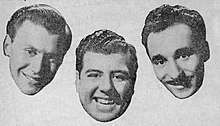Jerry Murad's Harmonicats
Jerry Murad's Harmonicats were an American harmonica-based group. The band was founded in 1947; by 2009, they were no longer performing. Originally they were named The Harmonica Madcaps and the group consisted of Jerry Murad (chromatic lead harmonica), Bob Hadamik (bass harmonica), Pete Pedersen (chromatic harmonica), and Al Fiore, (chord harmonica). They reformed later as a trio with Murad, Fiore, and bass harmonica player Don Les.

Pedersen and Gail Wallace remained contributors to the group throughout its existence, working on arrangements and occasionally recording.
During 1949 when Don Les' father died, the band called upon Johnny Thompson to fill in for Les on bass harmonica for a couple of weeks. Thompson went on to play with them at their residency gig at the Frontier Hotel in Las Vegas in the early 1950s. In the mid-1950s, Les suffered from a detached retina, and Thompson once again took his place until Les was able to return full time later in the decade.
Members
Jerry Murad
Jerry Murad (chromatic harmonica), was an Armenian born in Istanbul, Turkey who moved to America at the age of 2. He played diatonic harmonicas at first, and took up chromatic soon after. Murad played Hohner 270s and 64s, as well as the Musette, a harmonica made especially for him that replicates the sound qualities of a French accordion. It is featured on their 1960s recording of "Parisienne Fantasy". Murad also played the Hohner Polyphonia (a type of orchestral melodic harmonica).
Don Les
Don Les (Dominic Leshinski) (1914–1994) (bass harmonica) was born in Lorain, Ohio,[1] with congenital cataracts. He was able to see again at the age of twelve after a "couple of operations," but even as an adult his vision was only about 30% of normal.[2] At one point, he formed his own version of the Harmonicats. The Don Les Harmonicats, which featured Mildred Mulcay (of the harmonica duo the Mulcays) and Lenny Leavitt. They released a Christmas album entitled Christmas with the Don Les Harmonicats.
Al Fiore
Al Fiore (chord harmonica), was born in Chicago and started experimenting with chord harmonicas at the age of 13. Fiore played the rare pre-war Hohner Chord harmonica. He recorded the band's No. 1 hit, Peg o' My Heart on this harmonica.
Peg o' My Heart
Their 1947 recording of the song "Peg o' My Heart" (Mercury Records, originally Vitacoustic Records, catalog number 1) brought them public attention and sold over one million copies by 1950, reaching No. 1 on the U.S. Billboard chart.[3] Other charted hits included "Hair of Gold, Eyes of Blue," which reached No. 22, and "Cherry Pink and Apple Blossom White".
Discography
10" albums
- Jerry Murad's Harmonicats (Mercury, 1950)
- Harmonica Highlights (Mercury, 1952)
- Harmonica Hits (Mercury, 1952)
- Harmonica Classics (Mercury, 1952)
- Olé: South of the Border with the Harmonicats (Mercury, 1954)
12" albums
- Harmonicats' Selected Favorites (Mercury, 1955)
- South American Nights (Mercury, 1956)
- Command Performance (Mercury, 1956)
- The Cats Meow (Mercury, 1956)
- Dolls, Dolls, Dolls (Mercury, 1957)
- Harmonica Cha-Cha (Mercury, 1958)
- In the Land of Hi-Fi (Mercury, 1959)
- Harmonically Yours (Mercury, 1960)
- Cherry Pink and Apple Blossom White (Columbia, 1960)
- Peg o' My Heart (Columbia, 1961)
- Love Theme from El Cid and Other Motion Picture Songs and Themes (Columbia, 1962)
- Sentimental Serenade (Columbia, 1962)
- Fiesta! (Columbia, 1962)
- Forgotten Dreams (Columbia, 1963)
- The Soul of Italy (Columbia, 1963)
- Try a Little Tenderness (Columbia, 1963)
- The Love Song of Tom Jones (Columbia, 1964)
- That New Gang of Mine! (Columbia, 1965)
- Harmonica Rhapsody (Columbia, 1965)
- What's New Harmonicats? (Columbia, 1966)
- Great Themes from TV and Motion Pictures (Columbia, 1969)
References
- The Chronicle Telegram, Aug. 29, 1994 obit. & "Don Les" & "Interview with Don Les," pgs. 249-250, Harmonicas, Harps & Heavy Breathers (2000) Kim Field
- "Interview with Don Les," pgs. 250-251, Harmonicas, Harps & Heavy Breathers (2000) Kim Field
- Murrells, Joseph (1978). The Book of Golden Discs (2nd ed.). London: Barrie and Jenkins Ltd. p. 39. ISBN 0-214-20512-6.